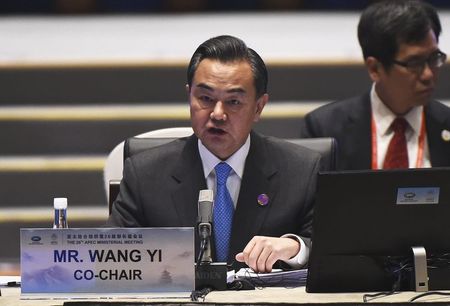By Ben Blanchard and Sui-Lee Wee
BEIJING (Reuters) - China said on Saturday it hopes Japan can create a favourable atmosphere for an expected meeting between the two countries' leaders, a day after the two sides signalled willingness to put a bitter row over disputed islands on the back burner.
Foreign Minister Wang Yi made the remarks at a briefing ahead of a meeting by leaders of the Asia-Pacific Economic Cooperation (APEC) group in Beijing.
Asked about a meeting between Chinese President Xi Jinping and Japanese Prime Minister Shinzo Abe, Wang said that "China attaches importance to Japan's repeated requests".
"We hope that the Japanese side takes this seriously, implements it faithfully and honours its commitment so as to create a necessary and favourable atmosphere for a meeting between the two leaders," he added.
China and Japan agreed on Friday to work on improving ties, paving the way for their leaders to meet on the sidelines of APEC.
State news agency Xinhua said later that Wang had met with his Japanese counterpart, Fumio Kishida.
Wang called the Friday agreement "a major step" toward the improvement of ties, the report added.
He "urged Japan to stick to a correct view of history and completely break away with the deeds and theories of its aggression in the past," Xinhua said.
A one-on-one meeting would be a symbolic breakthrough in ties between Asia's two largest economies, which have turned frigid in the past two years over a territorial row, regional rivalry and the bitter legacy of Japan's wartime occupation of China.
Both countries claim ownership of a tiny group of uninhabited islets in the East China Sea, called the Senkaku by Japan and the Diaoyu by China. The two countries acknowledged on Friday they held different views on the territorial dispute.
U.S. Secretary of State John Kerry, also speaking in Beijing, said he welcomed the reduction in tensions between the two countries, and said that he had discussed the agreement with both countries' foreign ministers.
"I want to be clear that the United States welcomes this initiative. We think that any steps the two countries can take to improve the relationship and reduce the tensions is helpful not just to those two countries but it's helpful to the region," Kerry said.
But he added that the agreement was at "the beginning, not the end".
"So over time, this will be given more meat on the bones. But we absolutely appreciate the initial effort. We think it's very constructive."
Beijing has also been particularly angered by visits by Japanese government ministers, including Abe, to the Yasukuni Shrine, which China sees as a symbol of Japan's past militarism.

Yasukuni honours millions of war dead, including wartime leaders convicted as war criminals by an Allied tribunal.
(Reporting By Ben Blanchard and Sui-Lee Wee; Additional reporting by Warren Strobel; Editing by Nick Macfie and Jeremy Laurence)
